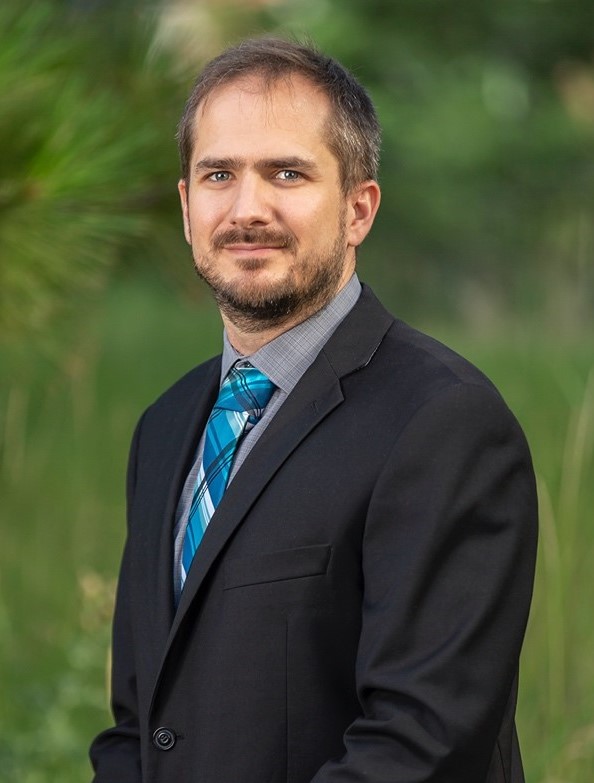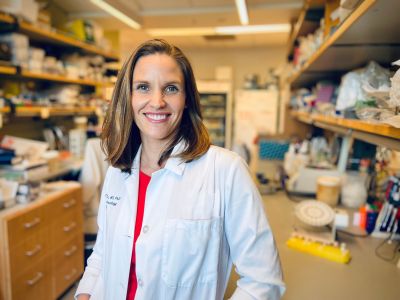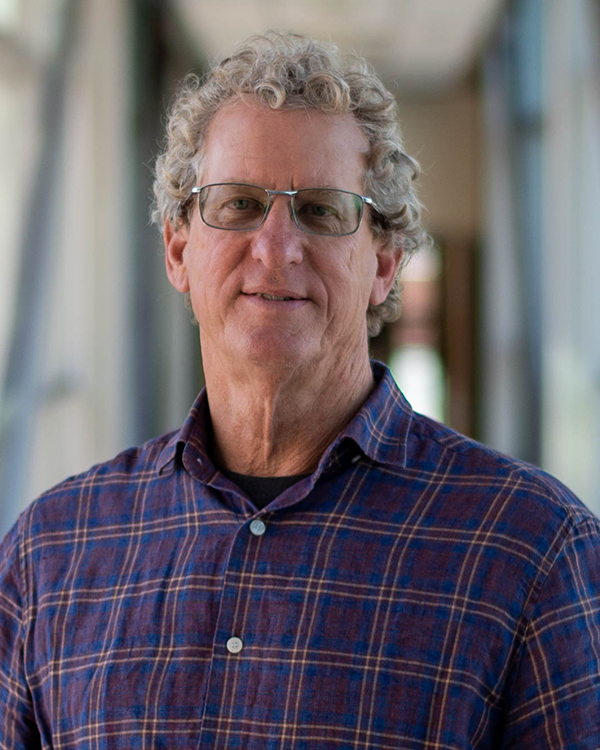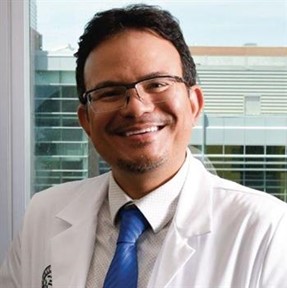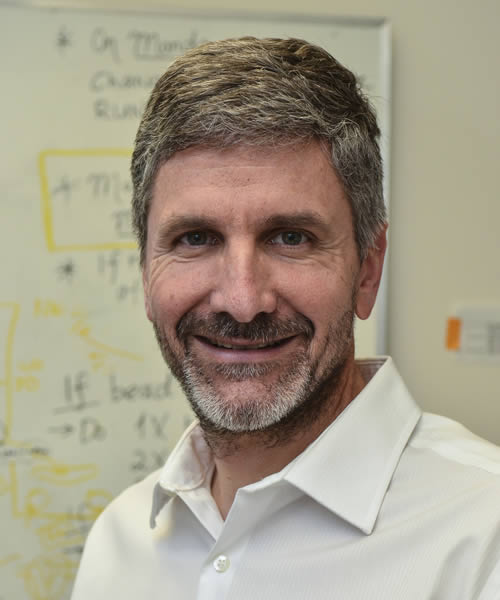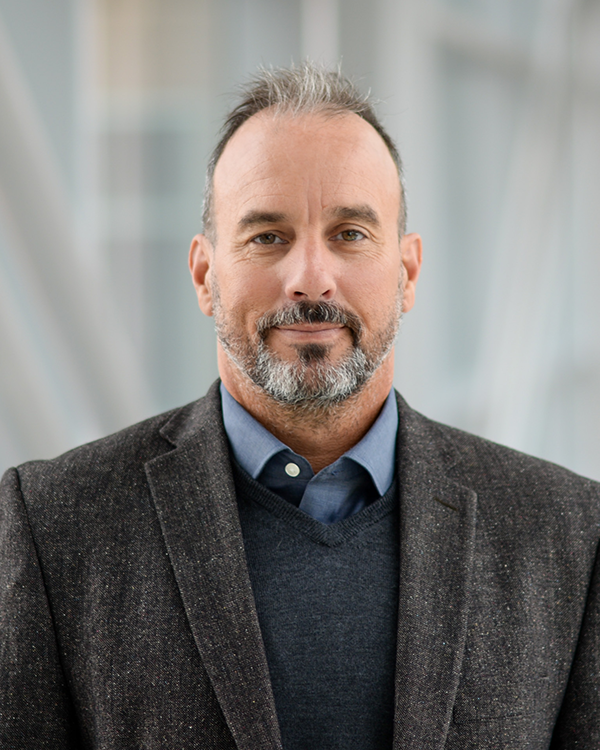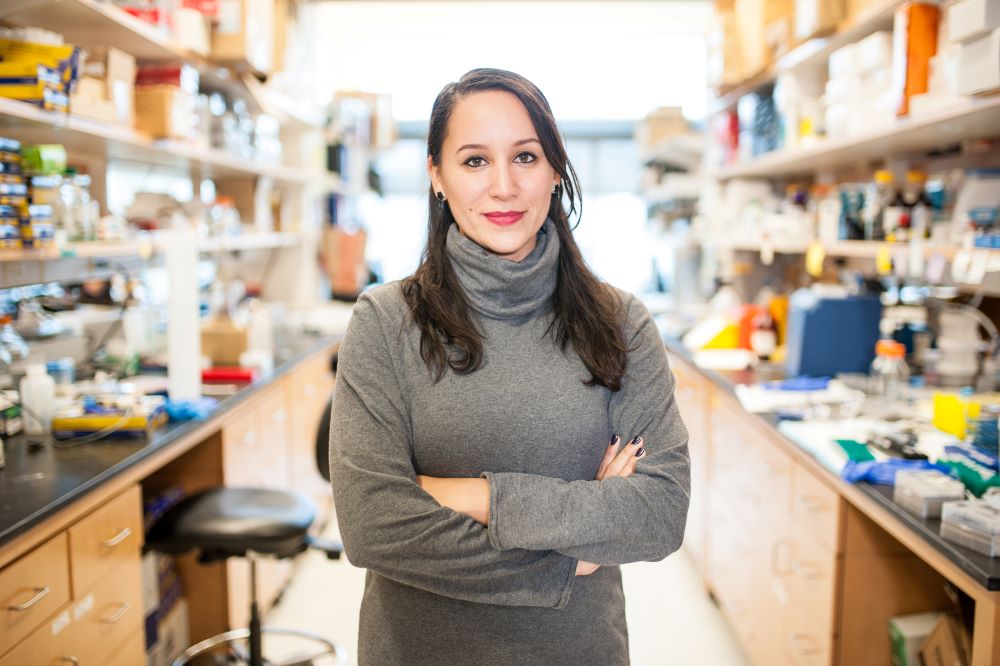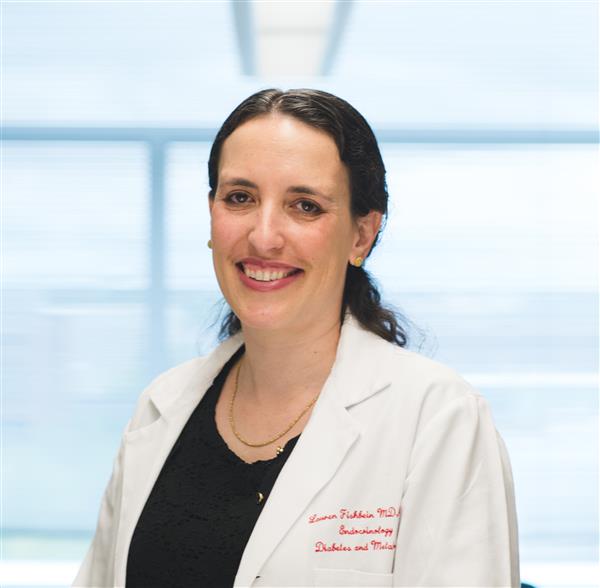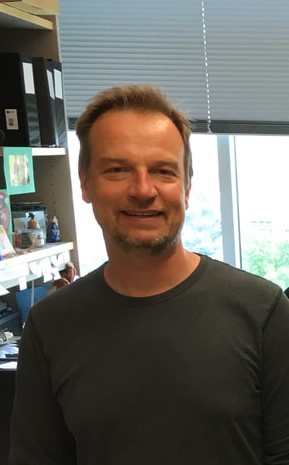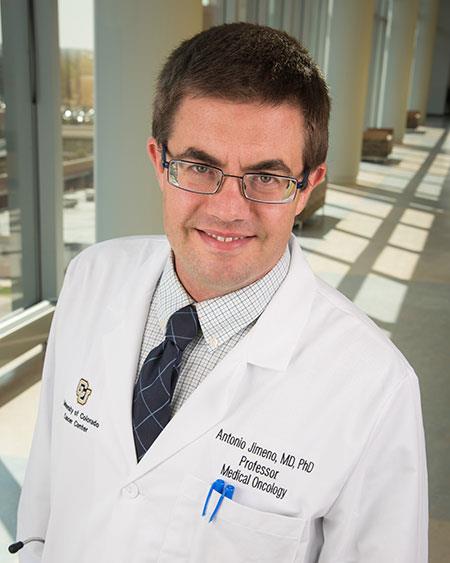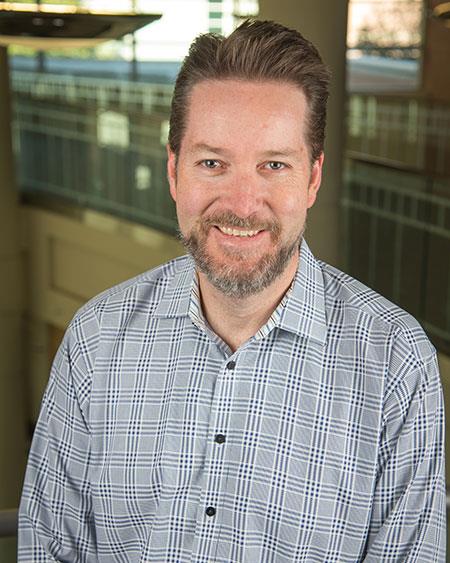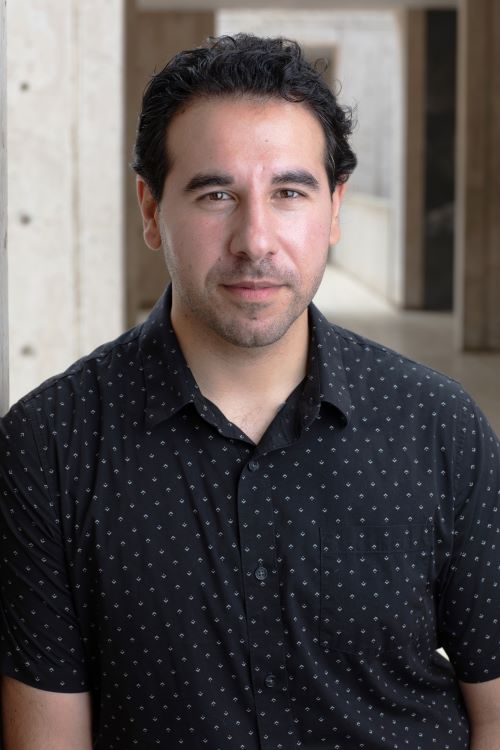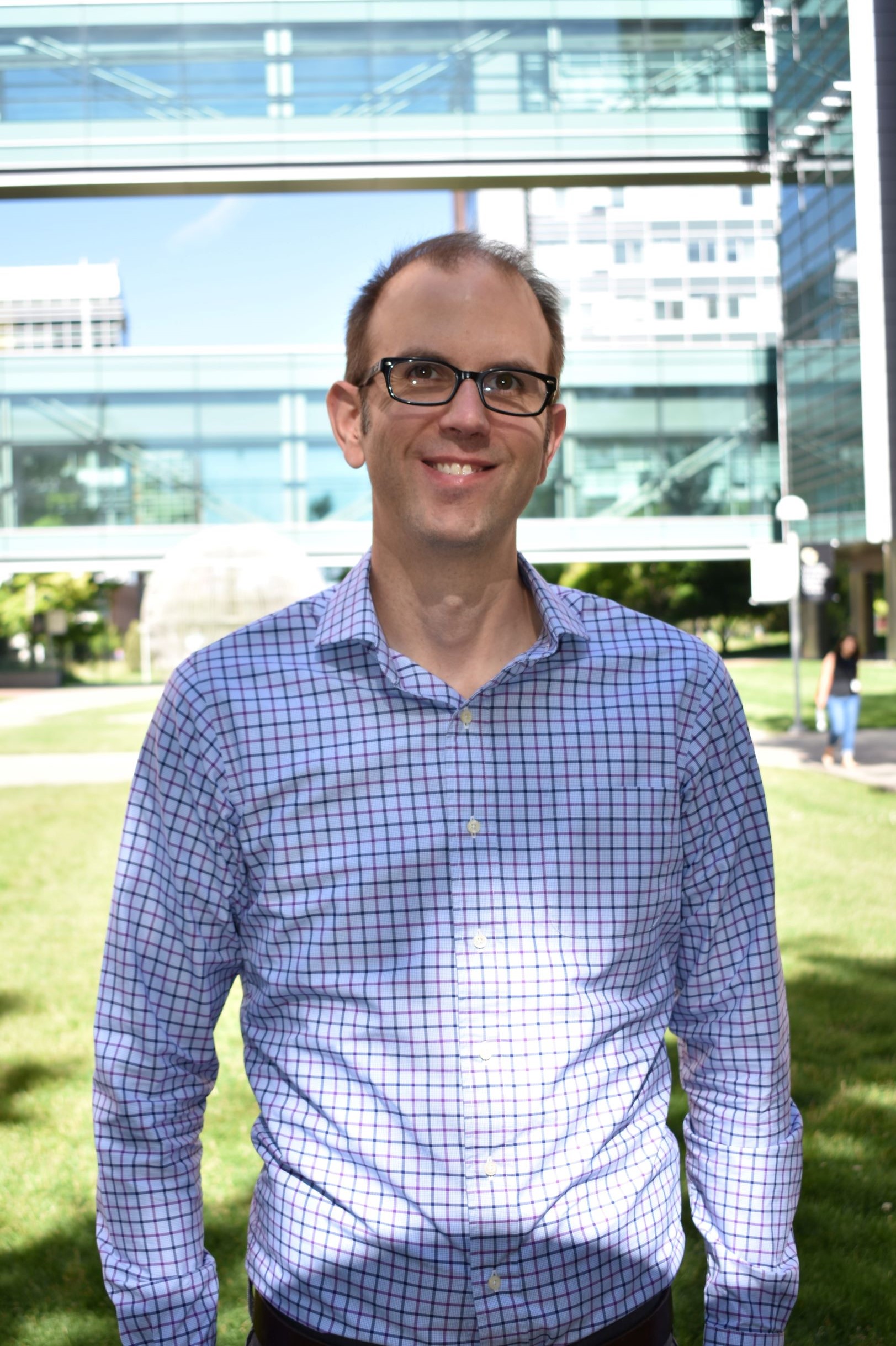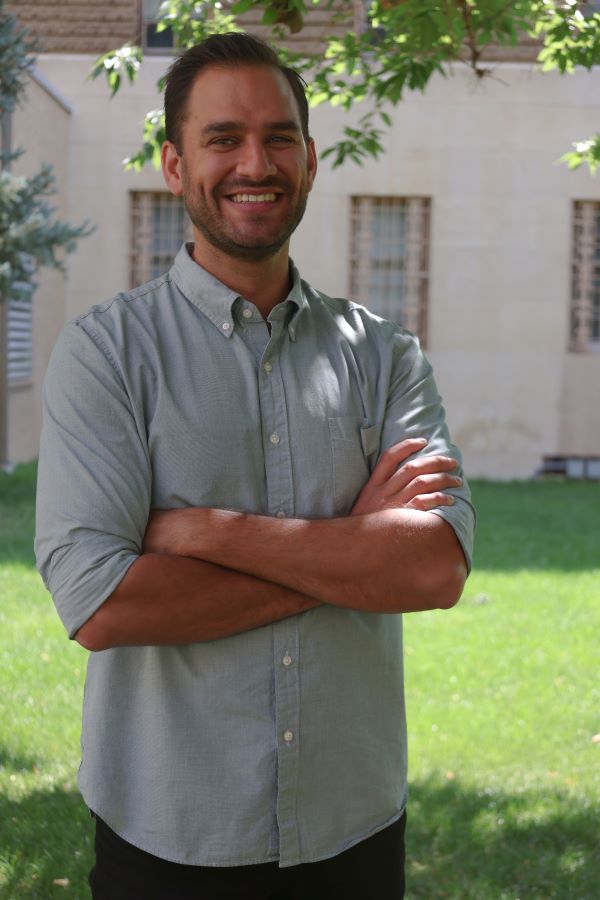FACULTY
Our program draws on faculty from many different departments within the medical campus and offers a wide range of research opportunities.
Note: CANB Affiliate Faculty are not able to serve as primary thesis mentors.
Search
Filter results by:
Michael Alberti MD, PhD
(he/him/his)
Assistant Professor
Research Focus:
Accepting Students
Cancer Biology
Gene Regulation
Genomics Bioinformatics
Stem Cells
The Alberti lab is working to better understand the genetic and molecular basis of splicing factor gene mutations in the initiation, development, and progression of clonal hematopoiesis and myeloid malignancies, such as myelodysplastic syndromes (MDS).
Email:[email protected]
Maria Amaya MD, PhD
Associate Professor
Our lab is interested in studying metabolic properties of myelodysplastic syndrome cells in order to develop novel therapeutic strategies.
Email:[email protected]
Caitlin Bell MD
Assistant Professor
Research Focus:
Accepting Students
Bioinformatics
Cancer Biology
Cardiology
Cardio-oncology
Cardiovascular & Pulmonary Biology
Cardiovascular Diseases
Cardiovascular/Pulmonary/Renal/GI Physiology
Cell Biology
Disease modeling
Despite significant advances, cardiovascular disease (CVD) and cancer are still the leading causes of death globally and are increasingly co-prevalent in aging patients. Mounting epidemiologic evidence demonstrates that patients with cancer have substantially increased morbidity and mortality from CVD, and those with CVD also have a concurrent increased risk of cancer. The Bell lab focuses on understanding the bidirectional interactions and mechanistic similarities between cardiovascular disease and cancer. We investigate this relationship using multiple techniques and levels of data including inducible lineage-tracing murine models, single cell RNA and ATAC sequencing, cell culture assays, and human genetics, with all of our hypotheses being further generated and refined by experience in the Anschutz Cancer Center's Cardio-Oncology Clinic. Discovery of these mechanisms and interactions allows for improved disease screening and stratification of high-risk patient populations, the development of new therapies for cancer-mediated CVD, and improved cardiac care for cancer patients and survivors.
Email:[email protected]
Benjamin Bitler PhD
Associate Professor
Completed Mentor Training Course; Completed Upstander/Bystander Training
Research Focus:
Cancer Biology
Structural Biology
Dr. Bitler is committed to the fight against cancer through his work to elucidate the impact of cancer-related signaling and epigenetic regulation.
Email:[email protected]
Andrea Bonetto PhD
(he/him/his)
Associate Professor
Completed Upstander/Bystander Training
Research Focus:
Aging
Cancer Biology
Molecular Nutrition & Metabolic Systems
The Bonetto Lab investigates the molecular mechanisms responsible for abnormal muscle, bone and liver crosstalks in cachexia due to cancer and/or anticancer treatments. In order to achieve our goals, we leverage different in vitro and in vivo models, paired with a set of comprehensive molecular, metabolic, and pharmacologic tools to dissect the causes of musculoskeletal abnormalities associated with cancer.
Email:[email protected]
Gina Bouchard PhD
(She/her)
Assistant Professor
Research Focus:
Accepting Students
Cancer Biology
Computational Biology
Metabolism
The Bouchard lab investigates metabolic reprogramming within the irradiated tumor microenvironment through a spatial biology approach. We utilize a variety of models including 3D patient-derived assembloids and tissues to investigate cellular rearrangements following treatment with the primary goal of uncovering spatial features linked to metabolic resistance, ultimately aiming to enhance the effectiveness of radiotherapy in cancer patients.
Email:[email protected]
M. Cecilia Caino PhD
(she/her/hers)
Assistant Professor
Facilitated and Completed Mentor Training Course; Completed Upstander/Bystander Training, Completed Equity Certificate,
Research Focus:
Accepting Students
Cancer Biology
Cell Biology
Cellular Structure
Signal Transduction
Structural Biology
Our group aims to understand how mitochondria reprogramming in tumors impact cellular behaviors that drive progressive and lethal cancer. We use a broad repertoire of biochemistry, cell biology, live cell imaging and animal models to study the impact of mitochondria shape, number and subcellular distribution in metastatic dissemination.
Email:[email protected]
Diana Cittelly PhD
(she/her/hers)
Associate Professor
Completed Mentor Training Course
Research Focus:
Cancer Biology
Inflammation
Neuropharmacology
Signal Transduction
Deciphering the mechanisms underlying increased risk of brain metastases in young women with triple negative breast cancer. These include ovarian estrogen effects on reactive astrocytes that results in paracrine activation of EGFR and TRKB signaling in brain metastatic cells.
Email:[email protected]
Cailin Collins MD, PhD
(she/her)
Assistant Professor
Research Focus:
Accepting Students
Aging
Cancer Biology
Hematology
Stem Cells
The Collins Lab aims to elucidate mechanisms through which preleukemic hematopoietic stem cells (HSCs) transform into overt myeloid malignancies, and to investigate how these processes can be therapeutically targeted to block leukemic transformation. To this end, our laboratory employs a novel, forward-engineered model of preleukemic transformation derived from CRISPR-modified human HSCs, together with primary patient samples, to drive our translational research program.
Email:[email protected]
James Costello PhD
(he/him/his)
Associate Professor
Pharmacology Program Director
Completed Upstander/Bystander Training, Completed Mentor Training Course
Research Focus:
Cancer Biology
Computational Biology and Personalized Medicine
Genomics Bioinformatics
Signal Transduction
Within the broad scope of systems biology, my lab focuses on 3 research areas: 1) Network inference for identifying drug targets, 2) Predicting drug sensitivity from -omics datasets, and 3) Modeling temporal effects of drug combinations.
Email:[email protected]
Scott Cramer PhD
Professor
Research Focus:
Cancer Biology
Genomics Bioinformatics
Prostate Cancer Tumor Suppressors, Stem Cells, Tumor Initiating cells, Signal Transduction, Receptor Signaling.
Email:[email protected]
Eduardo Davila PhD
Professor
Research Focus:
Cancer Biology
Immunotherapy
Our long-term goals are to develop novel approaches for treating immunorefractory cancers and to develop predictive models and diagnostics to identify compounds that sensitize tumors to T cell-based therapies.
Email:[email protected]
James Degregori PhD
(he/him/his)
Professor
Completed Mentor Training Course
Research Focus:
Accepting Students
Cancer Biology
Cell Biology
Exploring the conditions that foster somatic evolution and discovering cancer vulnerabilities.
Email:[email protected]
Patricia Ernst PhD
(she/her/hers)
Professor
Completed Mentor Training Course; Completed Upstander/Bystander Training
Research Focus:
Cancer Biology
Gene Regulation
Signal Transduction
Our group focuses on epigenetic mechanisms regulating normal hematopoiesis and leukemia focusing on MLL-family histone methyltransferases.
Email:[email protected]
Joaquin Espinosa PhD
Professor
Research Focus:
Cancer Biology
Signal Transduction
Our main research goal is to understand how gene networks control cell behavior in homeostasis and human disease. Our two main focus areas are cancer biology and Down syndrome.
Email:[email protected]
Daysha Ferrer Torres PhD
Assistant Professor
Research Focus:
Cancer Biology
Developmental Biology
Stem Cells
Dr. Ferrer Torres' lab focuses on understanding the molecular mechanisms driving human esophageal development, injury, and repair, with an emphasis on epithelial-mesenchymal interactions and differences in gastroesophageal reflux disease (GERD) among various populations. The lab investigates protective factors in esophageal tissues and uses patient-derived human organoids as a model system to study these processes. Additionally, the lab is interested in understanding esophageal cancer progression, aiming to elucidate injury responses specific to different ancestries and identify protective compounds through drug screening.
Email:[email protected]
Lauren Fishbein MD, PhD
(she/her/hers)
Associate Professor
My research interests are to understand what causes neuroendocrine tumors to form (pheochromocytomas, paragangliomas, gastrointestinal and pancreatic neuroendocrine tumors). I am particularly interested in studying the inherited and tumor specific genetic changes that lead to tumor formation. The long terms goals of my research are to identify markers to predict aggressive or metastatic disease which can ultimately be used to develop therapies for prevention and/or treatment of these tumors.
Email:[email protected]
Heide Ford PhD
(she/her)
Professor
Completed Mentor Training Course, Completed Upstander/Bystander Training
Research Focus:
Cancer Biology
Gene Regulation
Genomics Bioinformatics
Signal Transduction
Our laboratory focuses on a specific family of homeoproteins, the Six family, and their transcriptional cofactors, Eya and Dach. The Six1 homeobox gene is overexpressed in 50% of primary breast cancers and 90% of metastatic lesions, and its overexpression.
Email:[email protected]
Bryan Haugen MD
(he/him)
Professor
Research Focus:
Accepting Students
Dr Haugen is a physician-scientist who sees patients with thyroid cancer and does basic/translational and clinical research on thyroid cancer therapeutics. More recently, his research group and collaborators have been using multi-omic approaches and single cell RNA sequencing to better understand advanced thyroid cancer in humans and animal models.
Email:[email protected]
Lynn Heasley PhD
Professor
My lab investigates signaling networks involving RTKs, GPCRs, and chemokine/cytokine receptors that function as oncogene drivers and acquired/intrinsic resistance pathways to targeted therapeutics in lung cancer, head and neck cancer and mesothelioma. Our approach blends in vitro and in vivo functional genomics approaches with human and murine cancer cell line models to define both cancer cell autonomous signals as well as tumor microenvironment-derived signals that contribute to the overall sensitivity of these cancers to targeted drugs and immune therapies.
Email:[email protected]
Curtis Henry PhD
(He/Him)
Associate Professor
Research Focus:
Adaptive Immunity
Basic Sciences - Immunology
Cancer Biology
Cellular Structure
Immunotherapy
Innate Immunity
Stem Cells
Research conducted in the Henry laboratory focuses on understanding how cancer-associated comorbidities promote cancer with the goal of improving the efficacy of chemo- and immune-based therapies in patients falling within high-risk demographics.
Email:[email protected]
Paul Jedlicka MD, PhD
Associate Professor
Mechanism and targeting of aggressive properties of pediatric sarcomas.
Email:[email protected]
Antonio Jimeno MD, PhD
Professor
Research Focus:
Accepting Students
Dr. Jimeno’s laboratory and clinical research efforts aim at discovering new therapies and improving the outcomes of patients with head and neck cancer (HNC). He has developed PDX and humanized models to study cancer, and their application in new drug testing. He serves as the Director of the Colorado HNC SPORE, Director of the HNC Program, and co-Director of the Phase One Developmental Therapeutics.
Email:[email protected]
Craig Jordan PhD
(he/him/his)
Professor
Completed Mentor Training Course
Research Focus:
Cancer Biology
Developmental Biology
Dr. Jordan serves as the Chief of the Hematology Division and directs a research program focused on the development of novel therapies for the treatment of leukemia.
Email:[email protected]
Peter Kabos MD
Associate Professor
Research Focus:
Accepting Students
Dr. Kabos’ interest is in translating preclinical findings into novel treatments for patients with breast cancer. The Kabos lab focuses on the role of breast cancer stem cells and tumor microenvironment in treatment resistance.
Email:[email protected]
Robert Keith MD
Professor
Dr. Keith's main research interest is lung cancer chemoprevention and early detection. He was Principal Investigator (PI) of the NCI-sponsored Lung Cancer Biomarkers and Chemoprevention Consortium (LCBCC) Iloprost Chemoprevention Trial and is the PI of an ongoing VA lung cancer chemoprevention trial evaluating pioglitazone in high risk current and former smokers. He is also the co-PI on a recently initiated chemoprevention trial examining inhaled iloprost.
Email:[email protected]
Katja Kiseljak-Vassiliades DO
Associate Professor
My research interest is in endocrine neoplasia with focus on adrenocortical carcinoma. Our labs has generated first human adrenocortical carcinoma cell lines and patient derived xenografts in over three decades and are interested in new therapeutic targets. We have been exploring the targeting and mechanisms of several mitotic kinases, as well targeting immune checkpoints in our newly derived humanize mouse models of adrenal cancer.
Email:[email protected]
James Lambert PhD
Associate Professor
Our laboratory is investigating the potential of the small molecule drug AMPI-109 as a novel therapeutic agent for triple-negative breast cancer.
Email:[email protected]
Ryan Lanning MD, PhD
Assistant Professor
The Lanning lab uses optical frequency domain imaging (OFDI) to elucidate in vivo longitudinal and microscopic changes in the tumor microenvironment (TME).
Email:[email protected]
Shi-Long Lu MD, PhD
Professor
Research Focus:
Cell Biology
Role of PI3K/PTEN/AKT pathway in HNSCC progression.
Email:[email protected]
Traci Lyons PhD
(she/her/hers)
Associate Professor
Completed Mentor Training Course
Research Focus:
Accepting Students
Development
Dr. Lyons laboratory focuses on mechanisms of lymphatic mediated metastasis of breast cancer. Specifically, utilizing mouse models to investigate developmentally regulated programs of inflammation and lymphangiogenesis that are utilized in the adult mammary gland and may be hijacked by breast tumor cells. The results of these translational studies have the potential to instruct therapy aimed at prevention of breast cancer metastasis.
Email:[email protected]
Siddhartha Mitra PhD
Assistant Professor
Research Focus:
Accepting Students
Cancer Biology
The Mitra Lab is dedicated to unraveling the complex interplay between myeloid cells and brain tumors, with a focus on understanding how these immune cells contribute to tumor growth and therapeutic resistance in both adult and pediatric cancers. By dissecting the molecular and cellular mechanisms that drive myeloid cell involvement in the tumor microenvironment, we aim to uncover new therapeutic targets for macrophage-based immunotherapies. Our lab leverages cutting-edge techniques, including high-throughput spatial proteomics, bioinformatics, and CRISPR-based genome editing, to develop and test innovative myeloid-directed interventions. The Mitra Lab frequently partners with specialists in neurosurgery, immunology, and pediatric oncology to accelerate the development of effective treatments, such as myeloid checkpoint inhibitors, virus-based targeting therapies and next generation cell-therapies using CAR-engineered macrophages against aggressive brain tumors. Our ultimate goal is to translate our findings into clinical applications, providing new hope for patients with challenging malignancies.
Email:[email protected]
Jeffrey Moore PhD
(he/him/his)
Associate Professor;
Director, Cell Biology, Stem Cells & Development Program
Completed Mentor Training Course; Completed Upstander/Bystander Training
Research Focus:
Accepting Students
Cell Biology
Chromosome Biology
Genomics Bioinformatics
Molecular regulation of the microtubule network in cell division and disease.
Email:[email protected]
Joe Nassour PhD
Assistant Professor
Research Focus:
Accepting Students
Cancer Biology
My lab is interested in studying the molecular connections between aging and cancer. The focus is on understanding how the shortening of telomeres during cellular aging triggers autophagy and innate immune signaling pathways to suppress the early stages of tumor development. Our overarching goal is to deepen our understanding of cancer biology and develop innovative strategies to combat this disease.
Email:[email protected]
Raphael Nemenoff PhD
Professor
Research Focus:
Cancer Biology
Signal Transduction
My laboratory is focused on examining molecular pathways that regulate the progression and metastasis of lung cancer.
Email:[email protected]
Michael Oliphant PhD
Assistant Professor
Research Focus:
Accepting Students
Amino Acid Metabolism
Cancer Biology
Cell Biology
Chromosome Biology
Drug Screening
Epigenetics
Genomics
Metabolism
Organoids
Signal Transduction
Translational Research
The Oliphant Lab investigates how early genomic alterations and metabolic crosstalk shape breast cancer risk and treatment response. Specifically, we study arm-level copy number changes in normal mammary cells and how that may foreshadow cancer development and how amino acid transporters rewire metabolism to drive resistance in ER-positive disease. Using single-cell genomics, PDX-derived organoids, and focused drug screens, we aim to block cancer initiation and restore treatment sensitivity.
Email:[email protected]
David Orlicky PhD
Associate Professor
The study of lipid accumulation in non-adipocytes and how that process is regulated in multiple tissues, and in normal and pathologic situations.
Email:[email protected]
Chad Pearson PhD
(he/him/his)
Professor
Completed Mentor Training Course; Completed Upstander/Bystander Training
Research Focus:
Cell Biology
Cellular Structure
Macromolecular Structure
Centrosome and cilia biology in cell division, motility, and disease.
Email:[email protected]
Eric Pietras PhD
Associate Professor
Completed Mentor Training Course; Mentor Training Course Facilitator; Completed Upstander/Bystander Training
Research Focus:
Accepting Students
Cancer Biology
Cell Biology
Development
Developmental Biology
Inflammation
Molecular Nutrition & Metabolic Systems
Stem Cells
Interplay between inflammation and metabolism as a driver of leukemia development; targeting of pre-malignant and malignant blood-forming stem cells.
Email:[email protected]
Todd Pitts PhD
Associate Professor
The Pitts (GI Translational Research) Lab is focused on developing new novel therapies for colorectal and pancreatic cancers. The lab is interested in finding rational combination partners for molecularly-targeted anticancer and immunotherapy agents. The Pitts lab has a special interest in predictive biomarker and resistance mechanisms using correlative biological assays for early phase clinical trials.
Email:[email protected]
Nikita Pozdeyev MD
Assistant Professor
We use informatics to solve clinically relevant problems in thyroid cancer, such as risk assessment based on the analysis of thyroid ultrasound images and genetics, personalized thyroid hormone replacement therapy, and understanding thyroid cancer development and response to treatment at the level of a single cell. We employ methods of clinical informatics, artificial intelligence/machine learning and population genetics to address problems encountered while taking care of patients with thyroid cancer.
Email:[email protected]
Rytis Prekeris PhD
Professor
Molecular Biology Program Director
Completed Mentor Training Course; Completed Upstanding/Bystander Training
Research Focus:
Accepting Students
Cancer Biology
Cell Biology
Cellular Structure
Development
Developmental Biology
Regulation of cell division, cell polarity and cell migration.
Email:[email protected]
Jennifer Richer PhD
(she/her)
Professor
Graduate School Dean
Completed Upstander/Bystander Training; Completed Mentor Training Course
Research Focus:
Accepting Students
Cancer Biology
Cell Biology
The focus of my research is on the role of sex steroid receptors in breast and gynecological cancers, mechanisms of resistance to hormone therapy, and the differences between hormone dependent and independent breast cancers.
Email:[email protected]
Mercedes Rincon PhD
Professor
Completed Upstander/Bystander Training
Research Focus:
Cancer Biology
Molecular Nutrition & Metabolic Systems
The major areas of our research currently are: 1. Understanding how metabolism contributes to cancer chemoresistance and developing approaches to overcome chemoresistance; 2) Investigating MCJ as a target to enhance CD8 T cell mitochondrial metabolism and efficacy of CAR-T immunotherapy.
Email:[email protected]
Carol Sartorius PhD
Professor
Completed Mentor Training Course
Research Focus:
Accepting Students
Breast Cancer
Cancer Biology
The Sartorius laboratory studies the role of sex steroid hormones and their cognate receptors (i.e. estrogen receptor (ER) and progesterone receptor (PR)) in breast cancer.
Email:[email protected]
Rebecca Schweppe PhD
(she/her/hers)
Professor and Director, Cancer Biology Program
Completed Mentor Training Course
Research Focus:
Accepting Students
Cancer Biology
Signal Transduction
The focus of my lab is to identify novel molecular targets relevant to papillary and anaplastic thyroid cancer (PTC and ATC) with the ultimate goal of advancing these studies to clinical trials for thyroid cancer patients who do not respond to standard treatment. Trainings Completed: Certificate in Multicultural Mentoring, Implicit Bias Training, Bystander/Upstander Training, Active Listening Training to Support Student Mental Health
Email:[email protected]
Yiqun Shellman PhD
Associate Professor
Research Focus:
Cancer Biology
Cell Biology
Macromolecular Structure
Other Systems
Signal Transduction
Stem Cells
Structural Biology
My research focuses on melanocyte (pigment-producing cells) and melanocyte-related diseases, including melanoma and pigmentation disorders, with the aim of developing treatments and moving our research from bench to bedside. For melanoma research, we aim to improve patient survival by better understanding tumorigenesis and progression of melanoma, and host factors of antitumor immunity, and by developing melanoma treatments. For studies of melanocyte biology, we focus on SASH1, a novel pigmentation protein we identified, by studying a Hispanic family with an inherited pigmentation disorder.
Email:[email protected]
Daniel Sherbenou MD, PhD
(he/him)
Associate Professor
Completed Mentor Training Course
Research Focus:
Accepting Students
Cancer Biology
Our lab specializes in translational research on multiple myeloma, a debilitating and incurable blood cancer. We are focused on developing new therapies, including both large-molecule immunotherapies and small-molecule pathway inhibitors. We are also developing approaches to personalize treatment through real-time monitoring of drug resistance development using ex vivo drug sensitivity testing.
Email:[email protected]
Matthew Sikora PhD
(he/him)
Associate Professor
Completed Mentor Training Course
Research Focus:
Accepting Students
Cancer Biology
Pharmacology
The overall goal of the Sikora Laboratory is to understand mechanisms of response and resistance to steroid hormones and anti-estrogen therapies in breast cancer, with a special emphasis on invasive lobular carcinoma of the breast.
Email:[email protected]
Jill Slansky PhD
(she/her/hers)
Professor
Completed Mentor Training Course, Completed Upstander/Bystander Training
Research Focus:
Cancer Biology
Using an animal model for colon cancer, we are determining what substitutions in tumor antigen peptides improve antitumor immunity.
Email:[email protected]
Meredith Tennis PhD
(she/her/hers)
Associate Professor
Research Focus:
Cancer Biology
Lung Cancer
The Tennis lab is primarily focused on translational lung cancer prevention research, including chemoprevention and interception of premalignant lesion progression. We have published work on markers for targeted application of lung cancer chemoprevention, signaling pathways in lung cancer, and premalignant lung lesion biology. We are interested in developing preclinical models for premalignant lesions, investigating the biology of premalignant lung lesions and progression to tumors, and conducting correlative studies related to chemoprevention trials. We also have a strong interest in education and outreach, including running CU Science Discovery Anschutz programs, and are committed to supporting the development of diverse scientists-in-training through cancer research experiences in our lab.
Email:[email protected]
John Tentler PhD
Associate Professor
As part of the Developmental Therapeutics/GI Laboratory at UCD, my research is focused on pre-clinical studies of novel, rationally-based drugs for the treatment of advanced colorectal cancer, utilizing both cell culture and in vivo mouse model systems. These studies serve as a basis for therapeutic treatment options/choices for patients with advanced GI cancers in the UC Phase I Clinical Trials Program.
Email:[email protected]
Arianne Theiss PhD
(she/her/hers)
Associate Professor
Completed Upstander/Bystander Training; Completed Mentor Training Course; Completed Bias Reduction Course
Research Focus:
Accepting Students
Cancer Biology
Cardiovascular/Pulmonary/Renal/GI Physiology
Cell Biology
Cellular Physiology
Host-Pathogen Interactions
Inflammation
Innate Immunity
Stem Cells
The overall goal of the Theiss Lab is to elucidate the role and mechanism whereby mitochondrial signaling pathways in intestinal epithelial cells contribute to gastrointestinal diseases, specifically inflammatory bowel diseases (IBD) and colorectal cancer.
Email:[email protected]
Rajeev Vibhakar MD, PhD, MPH/MSPH
Professor
Research Focus:
Accepting Students
Cell Biology
My research focuses on genetic mechanisms by which normal brain cells become cancerous and how these genetic differences can be used to better diagnose and treat children with brain tumors,
Email:[email protected]
Margaret Wierman MD
Professor
Research Focus:
Endocrinology
Neuroendocrinology
Reproductive Biology
I am interested in Reproductive Endocrinology, Neuroendocrinology, Pituitary Disease, Disorders of Adolescence and Menopause and Hypogonadism in Men and Women.
Email:[email protected]
Matthew Witkowski PhD
(he/him/his)
Assistant Professor
Completed Upstander/Bystander Training; Completed Mentor Training Course
Research Focus:
Cancer Biology
We are dedicated to collaborative research investigating B-cell acute lymphoblastic leukemia (B-ALL) - the most common cancer in children. Many B-ALL patients will succumb to disease resistant to existing chemotherapy and immunotherapies, such as CD19-directed chimeric antigen receptor (CAR) T cell therapy. We aim to uncover how the immune system is remodeled by leukemic cells to foster their survival throughout therapy. Ultimately, we will endeavor to develop novel treatment approaches that modulate components of the leukemic immune microenvironment in order to improve B-ALL treatment outcomes.
Email:[email protected]
Rui Zhao PhD
Professor
Completed Mentor Training Course.
Research Focus:
Accepting Students
Cancer Biology
Gene Regulation
Macromolecular Structure
RNA Bioscience
My lab studies the mechanism of pre-mRNA splicing and the role of the Six1/Eya transcriptional complex in cancer. We are also developing small molecule or RNA-based approaches to target splicing or the Six1/Eya complex as potential cancer therapeutics
Email:[email protected]
Yuwen Zhu PhD
(He/Him)
Associate Professor
Completed Mentor Training Course; Completed Upstander/Bystander Training
Research Focus:
Accepting Students
Cancer Biology
Immunology
My research interest in cancer immunotherapy focuses on 1) identifying novel immune checkpoints, 2) characterizing pathways that limit intratumoral T cell infiltration.
Email:[email protected]



